|

 Krakow Info home page Krakow Info home page
Krakow
for mobile
devices
facts
joys
sights
events
musts
hubs
business
food
hotels
travel
buys
tips
Your
Questions
Answered
|
Traditional Festivals in Krakow
Hardly a month passes in
Krakow without some time-honored
occasion for common festivities or colorful celebration. The
following are just most popular ones.
/see also: culture festivals, folk traditions/
Christmas
Eve’s night begins with Christmas supper, a family
feast of 7-12 special dishes – no red meat and at least one
course of carp – followed by presents unwrapping and carols
singing, and it ends with popular ‘pasterka’, i.e. the
midnight "Shepherds’ Mass", in a favorite Krakow church (or simply the nearest
one). Christmas and notably the following holiday on
December 26 are traditionally occasions in Poland for
visiting friends and relatives. In the ensuing holiday
season also popular are such family pastimes as nativity
plays, nativity puppet shows, seeing elaborate Christmas
cribs (nativity scenes) in various Krakow churches and the
museum display of the best examples of famous Krakow cribs built over the last year.
Note:
Krakow's traditional
Christmas Market usually takes
place on the
central Rynek Glowny square
from the end of November to Christmas Eve.
|
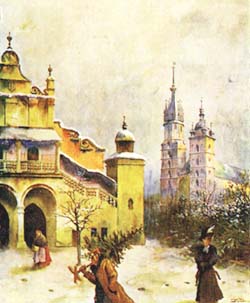
|
|
New Year
merrymaking is a must worldwide but on that night Krakow’s
entire Old Town historical district turns
into one giant ballroom. Tens of thousands of revelers swarm
its huge Grand Square with the adjacent streets
in frenzied rejoicing and pack into the area’s countless
clubs, cafes and restaurants. Such is the beginning of
Krakow’s long carnival season which ends with
the Shrove Tuesday frolics weeks later.
Fat Thursday, the last one before the Ash
Wednesday, is a festival of overeating when every Krakow
dweller devours the Fat Thursday's specials: ‘favorki’
crunch cakes and the Polish doughnuts (balls with
rose-petals jam filling) which are a must-eat treat on that
day.
Shrovetide (Polish ‘Ostatki’ or ‘Zapusty’)
crowns Krakow’s two-month carnival season. The Shrove
Tuesday’s ‘sledziowka’ festivities traditionally last till
dawn on the Ash Wednesday and they end with the Lent meal of
herring after which repentant revelers go straight to the
church to have their foreheads strewn with ash.
|
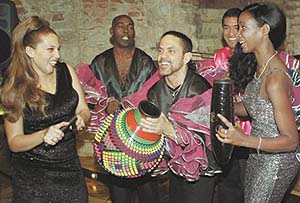
|
|
Lent’s
40 days are marked by profusion of special services and
ceremonies in beautiful Krakow churches, culminating over the
Holy Week, notably in the Good Friday’ mournful rituals.
Most striking is the hooded procession of the 400-year-old
Archfraternity of the Lord’s Passion, known also as the
Brothers of Good Death, held every Friday throughout the
Lent at the 13th-century Franciscan church in the very heart of the
city.
Easter festival spreads over
four days in Krakow. On the Holy Saturday everybody visits
the parish church with a basket of the traditional Easter
foodstuff – bread, eggs, ham, sausages, and a piece of
horseradish – to have them consecrated by priest, and to see
‘the grave of the Lord Jesus’ arranged in a chapel or a
crypt. Easter Sunday traditionally remains quiet and
confined to the family and the church. Yet Easter Monday is
devoted to socializing, the centuries-old Emaus fiesta being the chief venue.
Plus Poland’s tradition is splashing water over one another
on the Easter Monday; teenagers do it with zest and by
bucketful. Another Krakow’s time-honored fair, called ‘Rekawka’, takes place on Tuesday
after Easter.
|
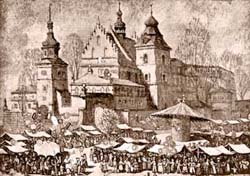
Great Emaus fiesta
on the Easter Monday has been Krakow's tradition for
centuries.
|
|
All Fools’ Day
on April 1 or ‘prima aprilis’ is universally observed in
Poland: expect endless pranks, jests, and innocent lies.
May 3rd is Poland’s national holiday –
Constitution Day. There are patriotic demonstrations as well
as fairs and picnics.
Saint Stanislaw’s Procession on the first Sunday
after May 8 gathers Poland’s cardinals and bishops, an array
of celebrities, and huge crowds of the faithful, who follow
the relics of the country’s patron saints from the Wawel Cathedral to the Skalka sanctuary.
Juwenalia is a colorful festival of Krakow
students who take over the streets and squares of the city’s Old Town historical district for a
week in May and, sporting funny disguises, indulge in wild
merrymaking. (Look the date and details up in the site’s Events section.)
Corpus Christi
procession from the Wawel Cathedral to Krakow’s central Grand Square gathers vast crowds of
the faithful, led by Krakow archbishop, as Our Lord’s statue
is carried to four street altars among a shower of flower
petals.
Lajkonik Parade
on the first Thursday after the Corpus Christi feast
proceeds for about six hours from the Zwierzyniec Premonstratensian convent
of St Norbert to the central Grand Square, accompanied by loud and high-pitched music. The
pageant's actors sport either Krakow folk costumes or fancy
oriental attire. Lajkonik is their leader – bearded fellow
in a Tartar disguise rides a wooden horse and prance
joyfully around.
|
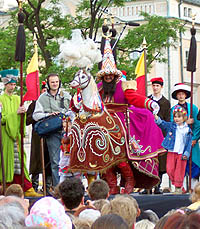
Lajkonik joyful
parade
|
|
Enthronement of the Cock King
takes place on Krakow’s central Grand Square in June, at noon, after a colorful parade of the
Cock Fraternity clad in the 17th-century Polish costumes.
The Cock Fraternity is a shooting association dating from
the Middle Ages, and the Cock King is the winner of its
yearly shooting contest. (Look the date up in the site’s Events section.)
Garlands (‘Wianki’)
midsummer festival is the Krakow variant of
Poland’s traditional all-night merrymaking by bonfires on
St. John’s Day, June 24. In Krakow it has always started
with girls floating wreaths of flowers and magic herbs with
lit candles down the Vistula (Wisla) river. Since the 19th
century the ancient custom has turned into a popular
fiesta and a show with musical acts and fireworks
display upon the riverbank opposite the Royal Wawel Castle
(now on Saturday nearest to June 24). Recently, a number of
alfresco concerts are taking place in the city's squares on
that day as well.
|
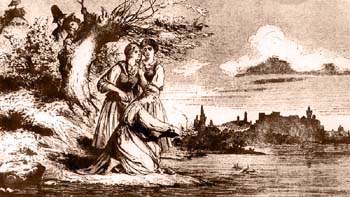
Girl-floated wreaths
on St John's night, Krakow's folk tradition.
|
|
Summer Krakow frenzy of
cultural events is largely aimed at
cosmopolitan crowd of visitors swarming the city while its
natives vacation on beaches or in the countryside.
Highlights include the Jewish Culture Festival, the
Street Theater Festival, the ‘Music in Old Krakow’
Festival, and the Krakow Jazz Festival. (Please look up the dates
in our
Krakow Events section.)
The
Krakow folk fair and festival
features Poland’s traditional countryside entertainers
alongside stands selling the wares of village artisans on
Krakow’s central Grand Square in August.
|
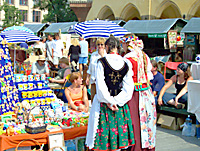
Folk festival on
the central square.
|
|
‘Andrzejki’
universal partying on the night of St Andrew’s Day, November
30, has folk origin reminded by fortune-telling from shapes
that melted wax takes when poured into water – in a break in
dancing.
All Saints’ Day, November 1 (as well as, to a
lesser degree, All Souls’ Day, November 2) is spent in
Poland on visiting cemeteries and commuting between them.
Everybody prays at graves, decked with fresh flowers for the
occasion, of the deceased relatives, and lights candles.
‘Mikolaj’ on St Nicholas’ Day, December 6, has been
always the date when children in Poland expected Santa
Clause bringing gifts. Except nowadays Santa usually bothers
again on the Christmas Eve.
Newly built famed Krakow Christmas cribs (ornate nativity scenes) – tens of
them, from tiny to giant – can be admired on the Old Town's
central Rynek Glowny square before noon on the first
Thursday of December. Successful entries for the yearly
Krakow Crib Contest are on display in the nearby City of Krakow Historical Museum,
35 Rynek Glowny at Szczepanska street, till early February.
 Krakow
Christmas guide
Krakow
Christmas guide
|
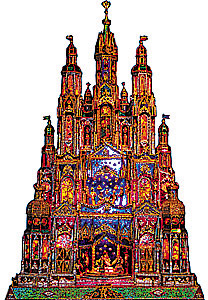
Krakow cribs merit
their fame.
|
|
Poland's national holidays are the New
Year Day, January 6 (Epiphany), Easter Sunday and Monday, May 1 (Labor Day), May 3
(Constitution Day), Corpus Christi Feast, August 15,
November 1 (All Saints Day), November 11 (Independence Day,
December 25 and December 26 (Christmas).
|
|










